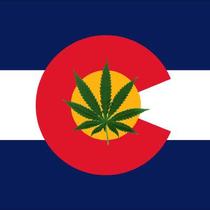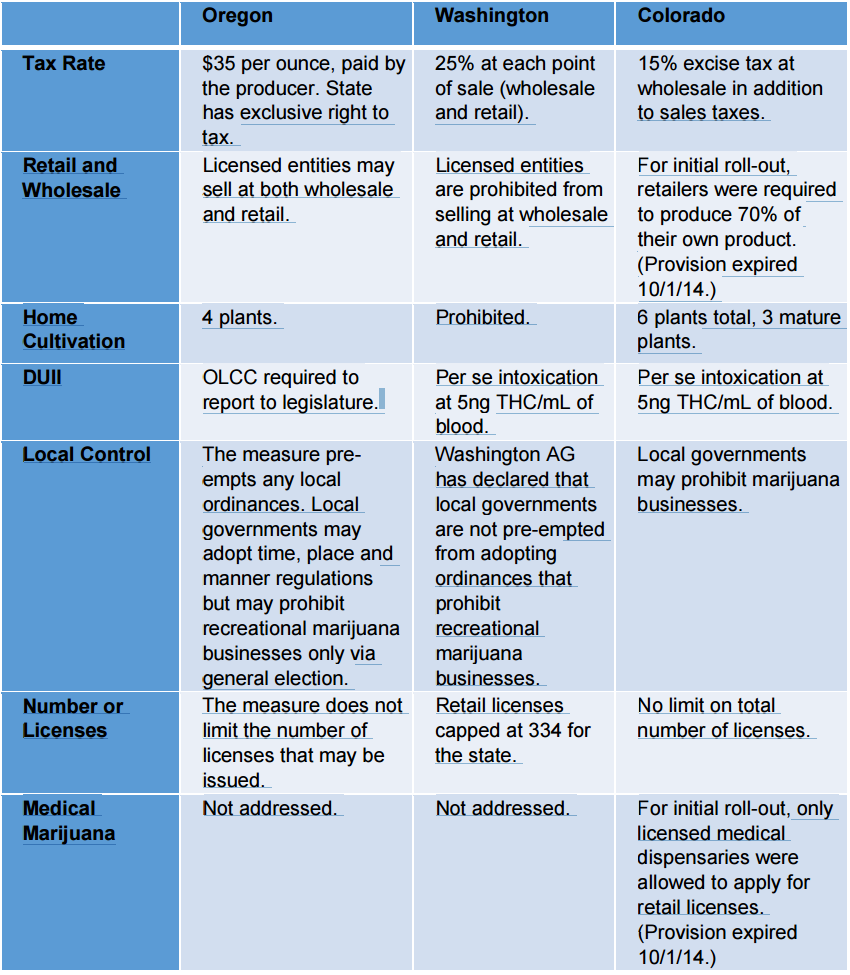Marijuana is currently legal in four states and the District of Columbia, and three of those states – Oregon, Washington, and Colorado – already allow open retail sale of the drug for personal use.

Marijuana may be legal in all these places, but their laws are not the same. Following is a comparison of cannabis statutes in Colorado, Washington, and Oregon, the three states where customers can buy marijuana on the legal market.
Oregon

The Beaver State allows adults over 21 to grow up to four plants at a time. But all four may be mature, meaning a decent harvest after a few months of cultivation.
Oregon allows both retail and wholesale transactions, meaning dispensaries may buy their product from independent farmers and processors rather than growing it themselves. The state levies a $35 tax on each ounce, and the drug typically costs less at retail than it would in Washington or Colorado.
Lawmakers have yet to pass effective cannabis DUI laws in Oregon, but the rules and penalties will likely be relatively moderate. It isn’t clear whether the state will adopt a “zero tolerance” approach, a “per se” limit, or a simple impairment test.
Zero tolerance laws punish drivers with any amount of THC in their blood; per se laws penalize motorists with more than a minimal amount; and the impairment standard targets only people who actually drive erratically. Oregon could go with any of these approaches, but a per se law is most likely. That’s both good and bad news for marijuana users, as per se is worse than impairment but better than zero tolerance.
Unlike Colorado or Washington, Oregon doesn’t enforce a cap on the number of retail cannabis licenses. This means the state will likely have more stores, but it could also cause a glut of product and a collapse of the legal market in a worst-case scenario.
Finally, Oregon doesn’t let local governments ban marijuana stores unless approved by voters in a general election. That makes the state the friendliest of the three when it comes to welcoming dispensaries and the customers who use them.
Washington

Taxes are higher in Washington than anywhere else: A 25 percent sales tax is levied on each point of sale – grower to processor, processor to retailer, and retailer to customer. This has proved problematic, as it initially drove the price of legal cannabis well above black market rates.
Washington bans wholesale cannabis transactions, leaving dispensaries to grown their own product. And the state uses a per se driving law: Anything over 5 nanograms of THC per milliliter of blood is considered conclusive evidence of stoned driving.
Unlike Oregon, the Evergreen State places a cap on the number of retail licenses and allows its municipal governments to ban all dispensaries within their borders. The state’s most conservative communities have already done so, leaving many shoppers to travel long distances for their cannabis.
Colorado
 Possession caps are lower in Colorado than elsewhere, with residents allowed to buy no more than one ounce at a time and out-of-staters limited to a quarter ounce. But residents may cultivate up to six plants and keep what they grow, so the practical limit remains fairly high.
Possession caps are lower in Colorado than elsewhere, with residents allowed to buy no more than one ounce at a time and out-of-staters limited to a quarter ounce. But residents may cultivate up to six plants and keep what they grow, so the practical limit remains fairly high.
Taxes are moderate in Colorado, with a total levy of 25 percent on each sale. Most of that comes from a 15 percent excise tax, while the rest comes from the state’s standard sales tax. Compared to Washington and Oregon, Colorado’s marijuana tax falls in the middle.
The Centennial State initially barred wholesale transactions, but that provision has expired, so dispensaries can get their supply from other providers. Laws governing high driving are the same as they are in Washington, tough but not unreasonably so.
Local governments are allowed to prohibit retail stores in Colorado, and many have done so. But the state doesn’t restrict the number of store licenses, meaning there is room for growth and new business opportunities; what’s more, some communities may eventually lift their bans.







